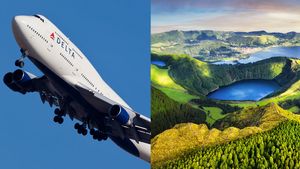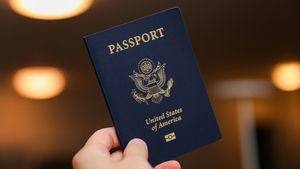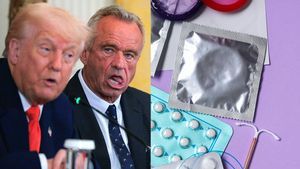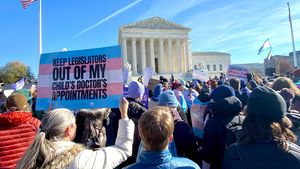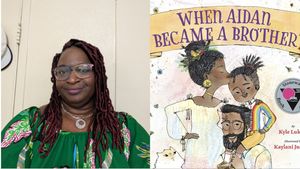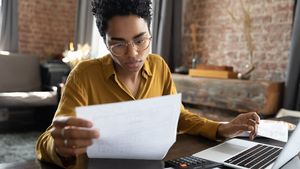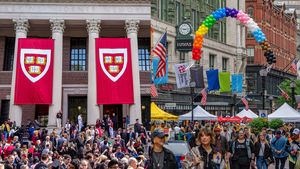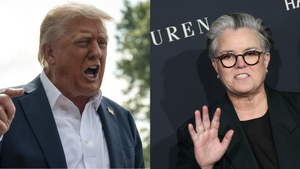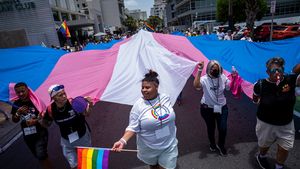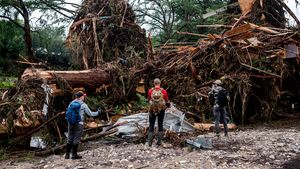When Hurricane Maria ravaged the Caribbean, it destroyed electrical grids, homes, agriculture, and anything else in its path. But the lasting effects are a complex kind of catastrophe: It's been a month since the storm passed, and the damage continues.
Puerto Rican photographer Anthony Velazquez is exploring a less-considered aspect: The ramifications for the millennial queer community of San Juan.
Related | Gallery: 12 Queer Millennials in Post-Maria Puerto Rico
He didn't have a full series in mind when he posed Anoma Lia, a San Juan drag queen, in a shower a few weeks ago. Aldrin Manuel Canals saw the photos and wanted his own, and so did Victoria Holiday, another local queen. All of them missed dressing up; when you're struggling to find water and a place to charge your phone every day, putting together a sickening look isn't exactly top priority.

Click here for Anthony Velazquez's full series
The project snowballed from there, and grew to include more drag performers, artists, students, and other members of the San Juan queer scene. The background elements intentionally reflect the times: A propane tank to power gas stoves closed businesses with storm shutters still in place, and a refrigerator that's empty for lack of electricity, but also reflects the frightening reality of food shortages on the island.
With every shoot, Velazquez conducted an interview, asking the subject questions about how Maria has changed their life.
"Most people are saying that the hurricane has shaken up all the plans that they had," he says. "It's made them prioritize, and they really can't achieve their immediate goals that they had at the moment, and they're trying to reorganize and see how they will make ends meet, little by little. They're not thinking about their long-term plans. They're just thinking of surviving day to day."
He's noticed some of the community has toned down their queerness, maybe as a means of precaution. In searching for supplies or electricity to charge devices, they're visiting unfamiliar places, making queer self-expression more precarious. ("It was like they didn't feel safe," he says).

Click here for Anthony Velazquez's full series
The day he photographed Canals--when Canals wasn't wearing makeup, but donned high-waisted pants--they felt the "weird looks" intensely.
"I don't know if [people outside the community] just think it's not necessary for people to be fashionable or trendy or weird, or they think I do it because I want to impress them," he says. "But I'm just doing it because this is how I feel comfortable... I wasn't wearing the gold pants because I was trying to impress everybody. These are the pants that were clean, and I wear them all the time. When we dress up, it's because we feel more comfortable; we do it for fun."
Communication issues were a hurdle, too. More cell towers have been restored just recently, but there are still areas on the island with absolutely no reception. Outside the metro area especially, things are generally more difficult, he notes.
"We're here in San Juan, and we really are very privileged [in that] I can go charge my camera batteries. I have to do it two days before, but I have that privilege that I can just go to the mall and charge my things, and yeah, I might not have cell reception but I'll just stop at the Burger King," he says. "To us, now, in Puerto Rico, that's privilege--just being able to do that. That's a huge privilege that other areas on the island don't have. In all of this, the people represented in the series, we've been a little more fortunate because we've had more access to these things, at least quicker."
After the interview, Velazquez was headed to Aguadilla, the northwestern coastal town he's from. His family was expecting to receive a generator from his sister, who lives in the states. Water service was restored to their neighborhood just last week, but they were still without electricity.

Click here for Anthony Velazquez's full series
Of the 12 subjects featured, five have made the difficult decision to leave Puerto Rico, Velazquez says. That choice is inherently personal, and the reasons vary--but one major factor behind the exodus of Puerto Ricans is undeniably economic strife. In August, unemployment clocked in last at 10 percent; today, with so many businesses still unable to open, it's fair to assume that number has risen drastically. Velazquez says he's considering relocating, too.
"I graduated in 2016 with a Bachelor of Arts in Linguistics and Communication. I graduated with a 3.95, the highest grade of my department, and I can't find a job anywhere," he says.
The Center for Puerto Rican Studies in New York estimates that 14 percent of the Puerto Rican population will relocate by 2019. For San Juan's young queer scene, the impact could be significant.
"I know there's still a lot of people here who aren't leaving and that can maintain it," Velazquez says. "But it's a sad reality, and we took a long time to build [this community]. Maybe four, five years, and even people before us were building it, but us? It took us a long time to find these places we felt comfortable in, people we felt comfortable dressing up around. We put work into this scene."


































